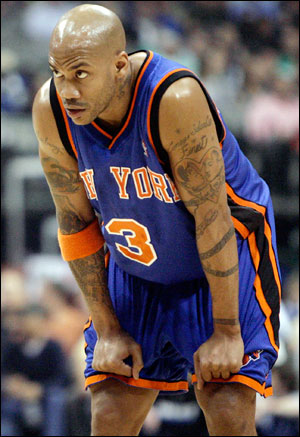
On the margins
I don't know if that threat is true, but I do recall a sage league source warning me last month to keep an eye on the Marbury-Thomas relationship early in the season.
Marbury's affair with a Knicks intern was dragged into evidence last summer in Thomas' sexual harassment case involving former team employee Anucha Browne Sanders, who won a $11.6 million judgment against the Knicks. The scout predicted that if Thomas were to reduce his point guard's role this season, then Marbury might melt down over his treatment by the Knicks. I'm sure Marbury feels he gets instigated or blamed for all of their problems -- his clashes with Larry Brown, the harassment suit or virtually every losing streak in which he is fingered for not doing enough to turn around the Knicks.
It's also fair to say that Thomas helped fulfill Marbury's sense of entitlement after trading favorable contracts and draft picks to the Suns four years ago for Marbury, who was welcomed back to his hometown of New York as a Knicks savior. As team president, Thomas could have instantly demanded more leadership and defense from his new star because Marbury was grateful to be rescued home after bouncing from Minnesota to New Jersey to Phoenix. But Thomas believed instead that he could elevate the Knicks by embracing and encouraging Marbury.
I remember after a game at Madison Square Garden one night when Thomas got so carried away with the praise that he began comparing Marbury to himself. "I've got to say, I think you're being unfair to yourself,'' I argued. "You won two championships, and you're trying to say that somebody who's never won a playoff series is as good as you were.''
Thomas no longer makes those claims. Maybe his perspective on Marbury has changed now that he's coaching him every day. But more relevant to the current tension is Thomas' overhaul of the Knicks' roster: They've morphed from a perimeter team to a low-post team built around the size of Eddy Curry, Zach Randolph and David Lee.
If the Knicks were to buy out Marbury -- an option being considered by Thomas and owner James Dolan, according to the Daily News -- then their reconstruction would come into sharp focus. Among the 11 remaining Knicks capable of playing meaningful minutes right now (youngsters Wilson Chandler and Randolph Morris and injured center Jerome James aren't in the mix), Malik Rose, who turns 33 later this month, would be the only player older than 28, and Randolph would be the only one making more than $9 million per year.
The average age of that rotation would be 26 years and the payroll for those 11 players would be a reasonable $58.8 million. With his guaranteed $40 million over the next two years, his sense of entitlement and his NBA mileage as a 30-year-old in his 12th season, it's easy to see how Marbury doesn't fit in with the rest of his team.
Look, I'm not nominating Thomas to be Executive of the Year. The Knicks' league-leading $96 million payroll is proof of the red-ink mistakes he's made. In recent years, he's committed $120 million in buyouts and fees to Brown and players Shandon Anderson, Jalen Rose, Maurice Taylor and Jerome Williams and Dan Dickau. To repeat: They've paid $80 million (plus another $40 million in luxury taxes) to people for not playing or coaching.
The Knicks have taken an innovative approach to remodeling. When other franchises turn over their rosters, they usually trade their most expensive talent for expiring contracts, young players and draft picks, which leads to an extended rebuilding process. The Knicks, because they're rich, have instead bought out many of their bad contracts, which has opened up spots on the roster to hasten their rebuilding and exploit Thomas's ability to find value in the draft.
It's like they have two rosters: the new roster of young players around whom Thomas is hoping to define the franchise, and the haunting old roster of overpaid players in their 30s like Marbury, Rose and Jerome James.
While the Knicks deserve ridicule for the outlandish contracts they've awarded over the years, they also deserve some credit for owning up to those mistakes and buying out the contracts. Far better to open up the roster spot than to compound the original mistake by tying up room on the bench.
Do they buy out Marbury? When I played the longshot and picked the Knicks to finish sixth in the East this season, it was based on the assumption that they would rely more on young point guards Nate Robinson and Mardy Collins at the expense of Marbury, who -- if he would accept it as humbly as Manu Ginobili has in San Antonio -- could be an excellent sixth man as a microwave off the bench. Statistically, Marbury is their best point guard, but he isn't what they need anymore. With scorers Randolph, Curry and Jamal Crawford dominating the lineup, the Knicks need a distributor and defender starting in the backcourt. But, of course, Marbury is going to view a change in his role as a demotion.
It's clear that Thomas is approaching this season with newfound urgency amid speculation that he must win in order to keep his job. Will he dispose of Marbury in order to demonstrate faith in his young players? Or will buying out the contract prove too costly if Marbury spends the rest of the season dishing out dirt on Isiah and the Knicks?
A third option may prove viable: Mend the relationship and deploy Marbury depending on the matchup. He'll play more minutes against some teams and not so much against others.




